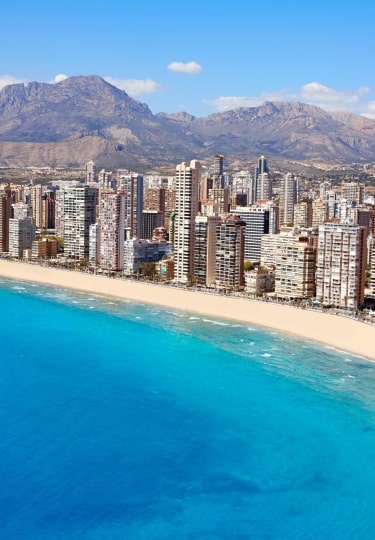With over 2,000 beaches, Spain leaves you spoilt for choice for a sea, sand, and sun escape. What’s best, though, is that many of these are urban beaches, presenting the opportunity to experience the culture and cuisine of waterfront towns and cities and enjoy a taste of Spanish beach life at the same time.
From San Sebastian, up against the border with France in the northeast, to Malaga in the southwest, the contrasts are strong. Cadiz, on the Atlantic west, and Barcelona, on the Mediterranean east, are different again.
Here are 12 of the best Spanish coastal cities to visit.
La Coruña

Playa de Riazor, La Coruña
Galicia’s La Coruña may be on the Atlantic, rather than the Mediterranean, but it’s still a perfect beach town. It has great beaches, of course, but also rugged landscapes.
The beaches of Playa del Orzan, and Playa de Riazor are right in front of the city promenade. Facing the open Atlantic, inside a bay, they are beloved of surfers.

Tower of Hercules, La Coruña
One unmissable Spanish landmark is the Tower of Hercules, parts of which date back to Roman times. Standing nearly 200 feet high, it’s a still-active lighthouse
Galicia’s cuisine, rich in seafood and fresh farm produce, mixes Spanish, Portuguese, and French influences. You’ll come away addicted to empañadas, baked pastries filled with anything from octopus to beef.

Santiago de Compostela, near La Coruña
A marked contrast to these culinary pleasures is the magnificent cathedral of Santiago de Compostela. Marking the end of the famous pilgrimage route, it’s within easy reach of La Coruña.
Cadiz
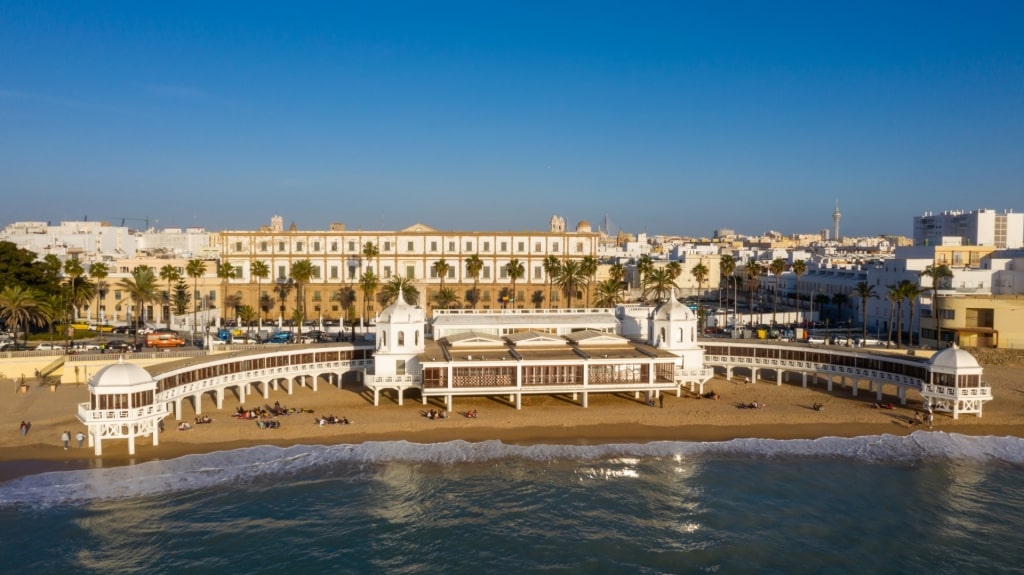
La Caleta, Cadiz
The port of Cadiz has one of Europe’s best urban beaches in La Caleta. It’s in the heart of the old city, on a bay with a scenic Spanish castle at each end.
Although the smallest of the three beaches in Cadiz, La Caleta is the most popular and is known as one of the best beaches in Southern Spain. It has golden sands, and there are many good restaurants, two spas, and even flamenco bars within easy reach.
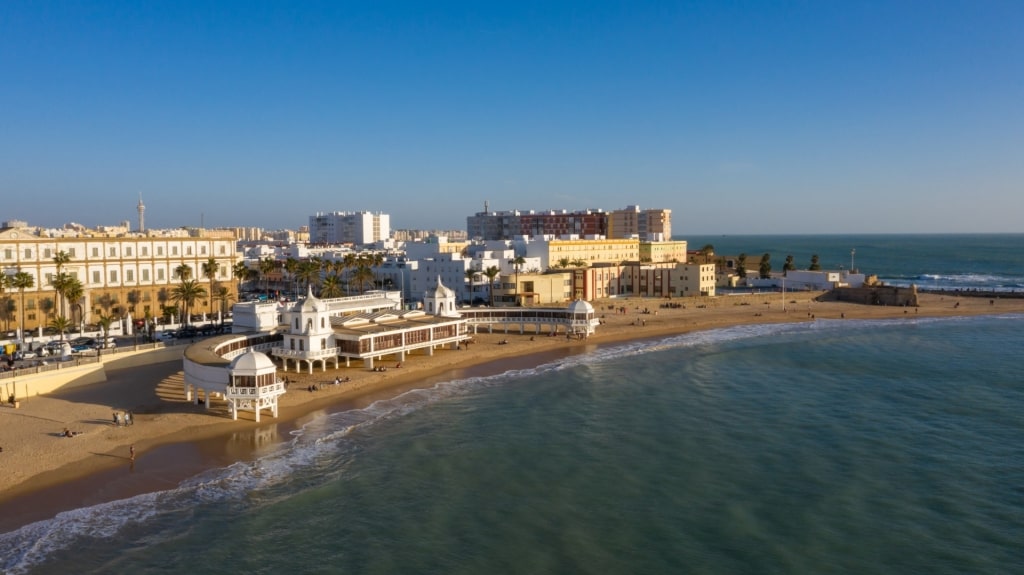
La Caleta, Cadiz
Cadiz, one of the oldest inhabited cities in Europe, was built on the wealth of the Americas. Much of that is reflected in the gold-rich interior of the main Cathedral, whose tower can be climbed for great views of the city.
Don’t miss the lively fish market in the Mercado Central. Then enjoy a coffee in Parque Genovés, a shaded haven in which to escape the Andalusian heat among flowers, trees, and fountains.
Palma de Mallorca
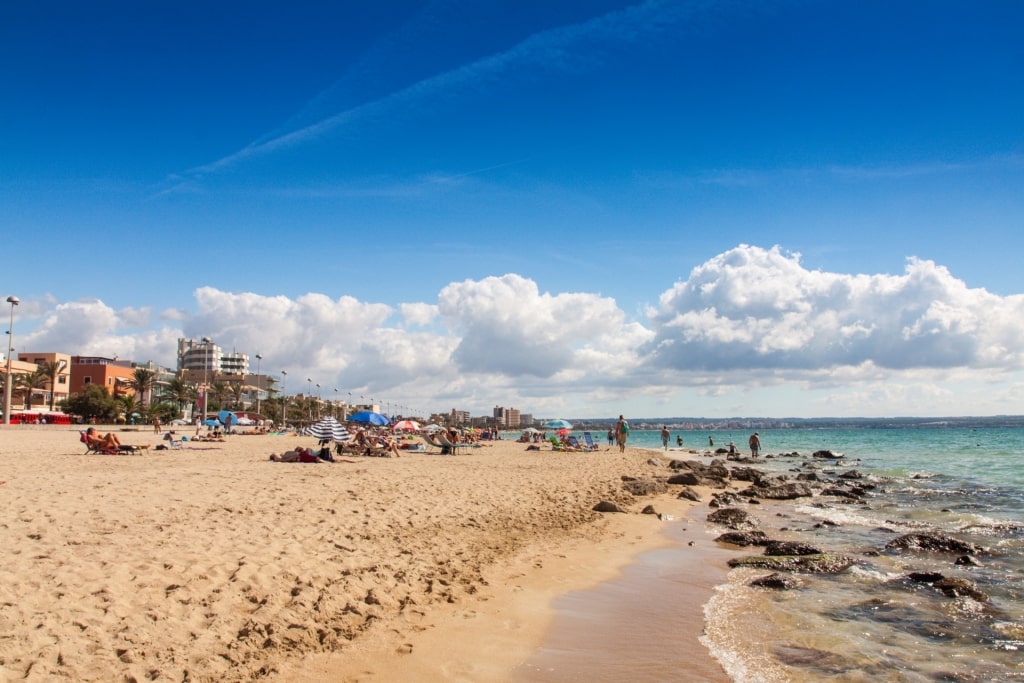
Playa de Palma, Palma de Mallorca
The Cathedral of Santa Maria de Palma sits high over the capital of Mallorca. The whole island is full of delights but you don’t even have to leave Palma, one of the best beach towns in Spain, to enjoy a spot of sunbathing and swimming.
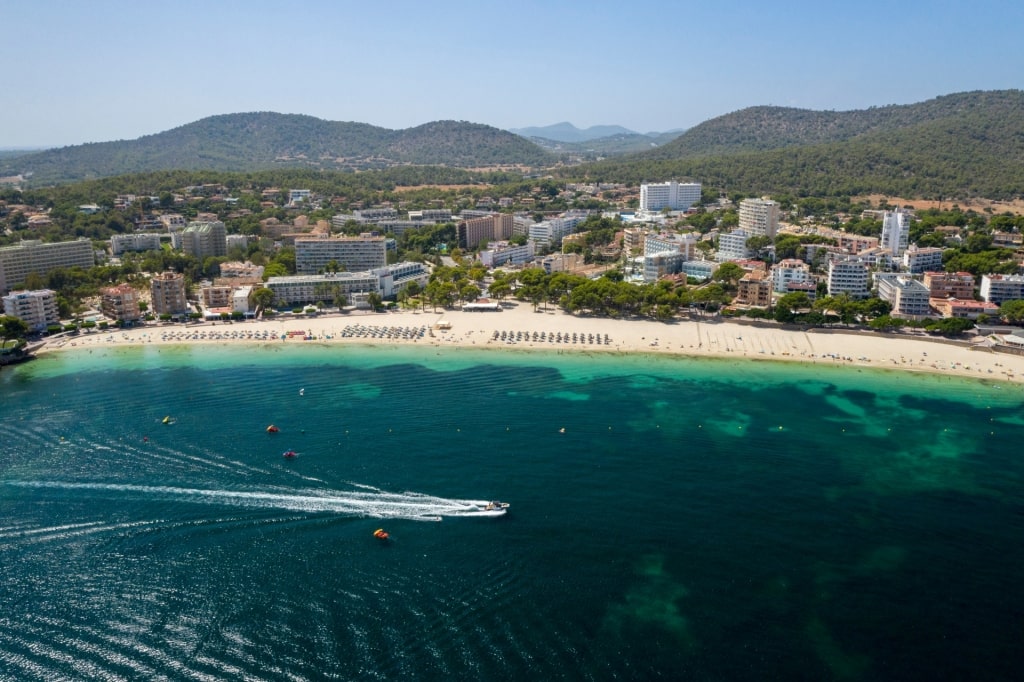
Palma Nova Beach, Palma de Mallorca
Playa de Palma is the busiest beach in Mallorca—for good reason. Slightly further out are the lovely Es Trenc, and Cala d’Or beaches..
Back in Palma, the Casco Antiguo, or old center, beckons. Sample Mallorca’s tapas in sandy cellar bars, look inside medieval churches, or shop for local art and crafts.
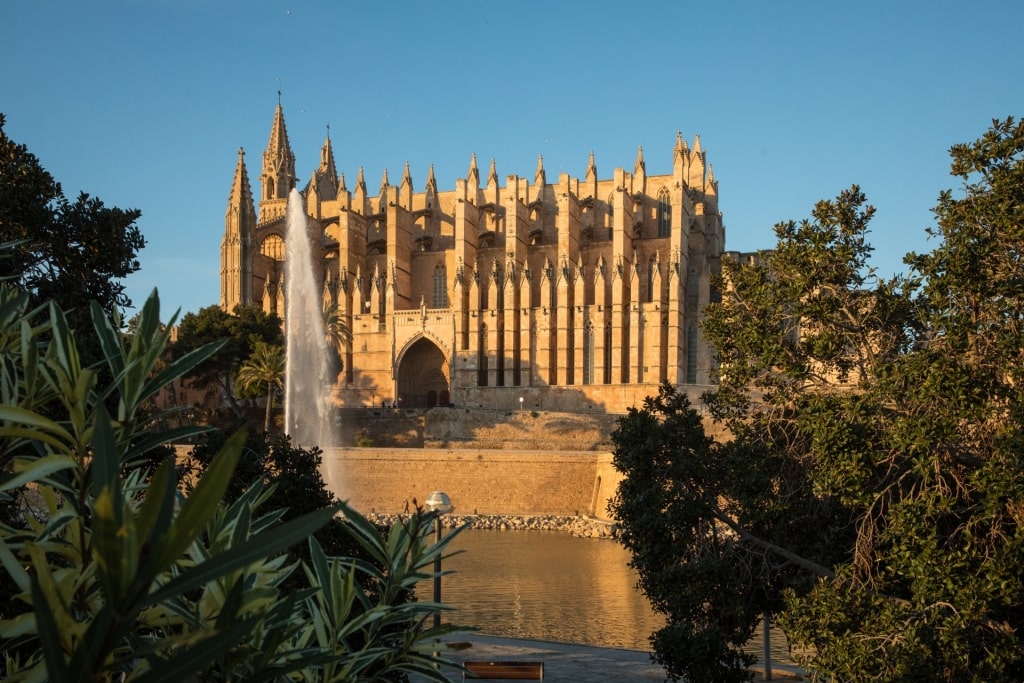
La Seu Cathedral, Palma de Mallorca
Your eyes, and feet, will probably be drawn back again and again to that cathedral. This gothic delight, with modernist touches by a disciple of the great Antoni Gaudí, has amazing stained glass windows that give it the nickname of the “Cathedral of Light”.
Read: The Ultimate Mallorca Food Guide
Malaga
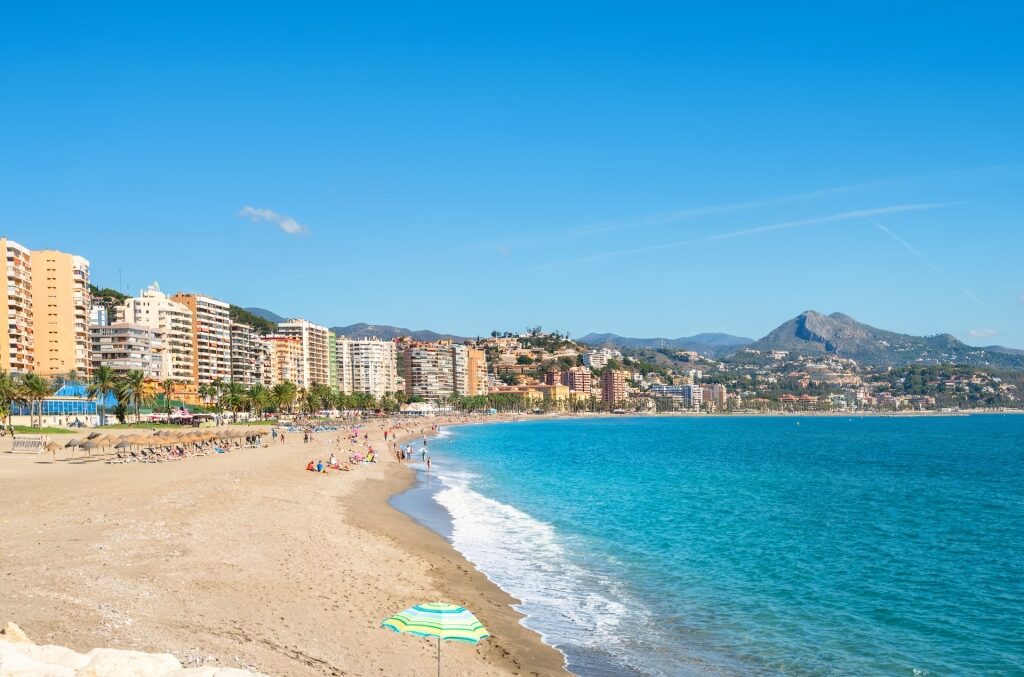
La Malagueta, Malaga
The city of Malaga, on the coast of sunny Andalucia, has reinvented itself from a busy port town to a center for art and great cuisine, with an enchanting old center where Picasso was born.
Malaga’s beaches are a major part of the appeal, especially La Malagueta near the center. Nearby is Playa La Caleta, with other beautiful playas stretching west for miles to the resort town of Torremolinos.
La Malagueta, with its proximity to the restaurant, cafés, and other facilities, is always popular. It has some 2,600 feet of fine sand on which to enjoy the Costa del Sol sunshine.
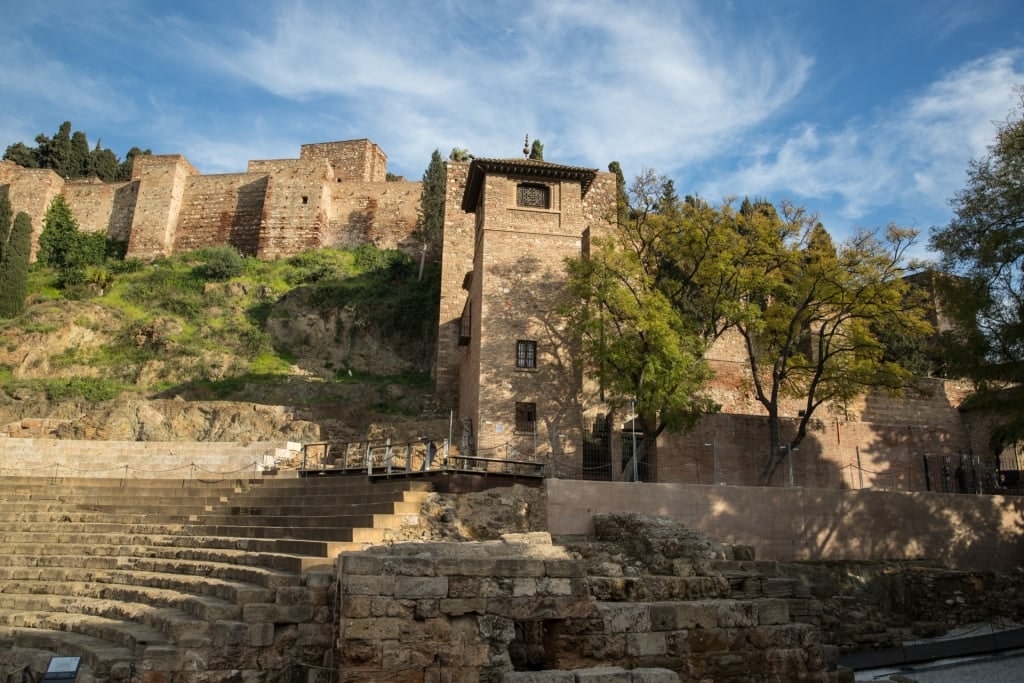
Alcazaba, Malaga
Malaga’s Alcazaba (“Citadel”) is not to be missed, especially if you’ve no time to see the more famous one in Granada. A Spanish museum dedicated to Pablo Picasso, an outpost of Paris’ contemporary Centre Pompidou, and the city’s magnificent cathedral are also essentials.
San Sebastián

San Sebastián
San Sebastian sits on the Bay of Biscay in the north of Spain. Part of the Basque region, it is famous for its food and its beaches.
Ranked as one of the best beach resorts in Europe, the city has three major beaches—and a less-known fourth. The most famous beach in the city is Playa de la Concha, which gazes over a spectacular bay.
In the middle of the bay is Santa Clara Island, on which you’ll find that fourth beach. There is also a delightful natural swimming pool, and a lighthouse to make the picture-perfect backdrop.

Playa de Ondarreta, San Sebastián
The beaches of Playa de Ondarreta, and Playa de la Zurriola complete the set. Ondarreta is deeper than la Concha, making it more popular at high tide, while La Zurriola is known for its surfing, which lends it a youthful vibe.

Pintxos
Away from the beach, you’ll want to try the Basque tapas that Spain is known for, called “pintxos”. Much of the traditional cuisine has been preserved by “txokos”, private gastronomic clubs that were once the preserve of men only, but are now open to all.
Marbella
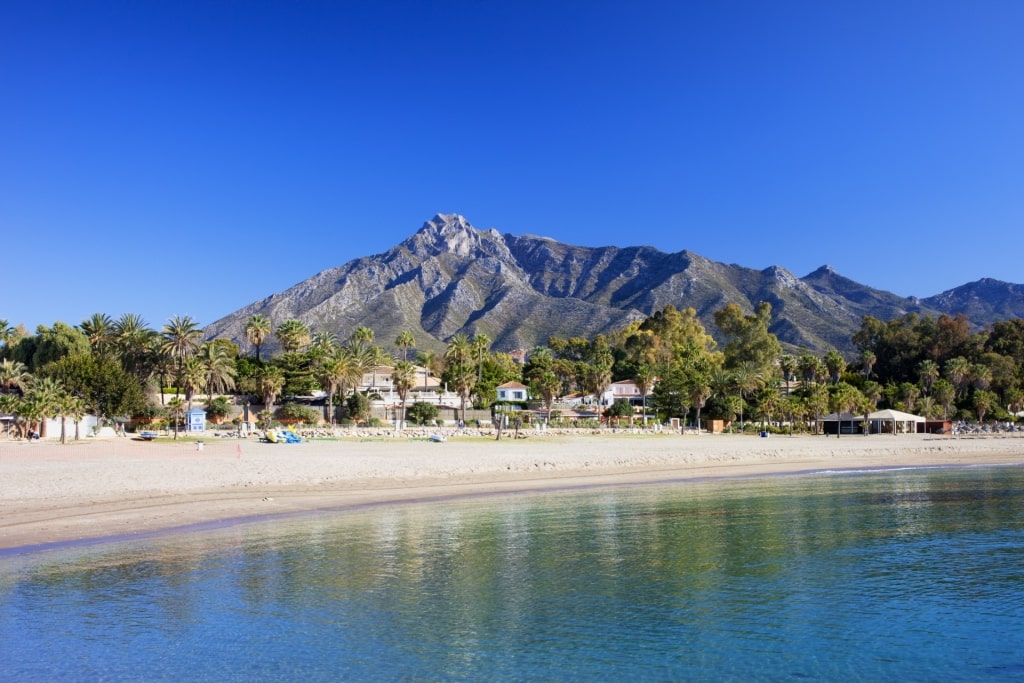
Marbella
Another Costa del Sol destination, glamorous Marbella is known as one of the best beach towns in Spain for good reason. Its 20 beaches are magnificent, while the cobbled streets of the Casco Antiguo (“Old Town”) are perfect for evening strolls.
At the heart of the Casco Antiguo is Plaza de los Naranjos. Dating to 1485, it’s named for the orange trees around it.
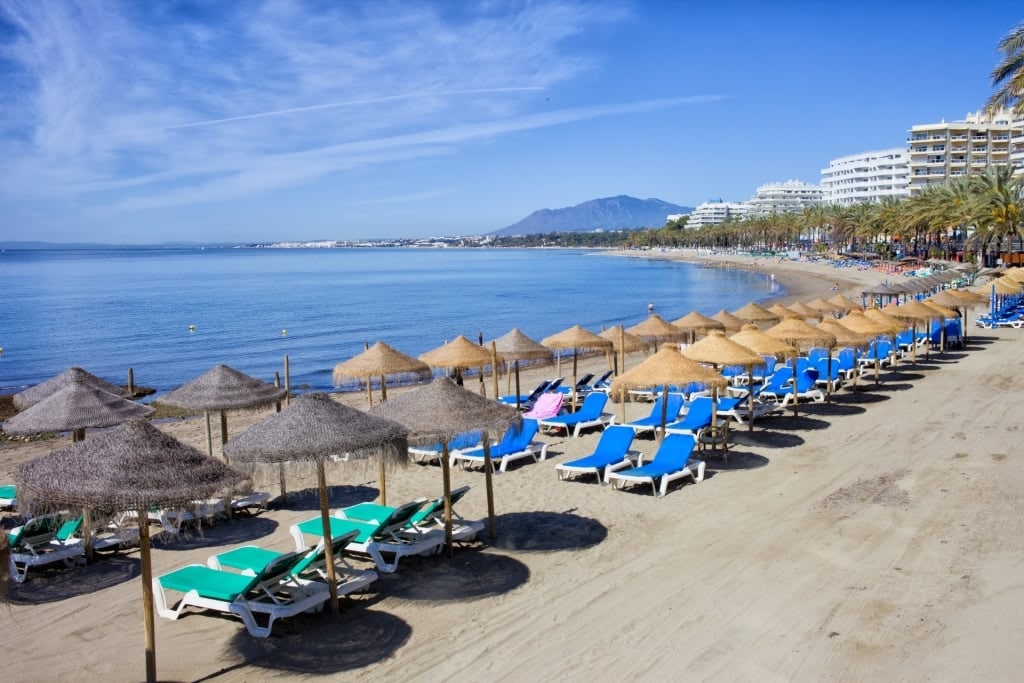
Playa Fontanilla, Marbella
Marbella’s beaches have won numerous Blue Flag awards for their quality and cleanliness. Playa Fontanilla is the closest to the center, while Playa Nagüeles is perhaps the most exclusive among several strong competitors.
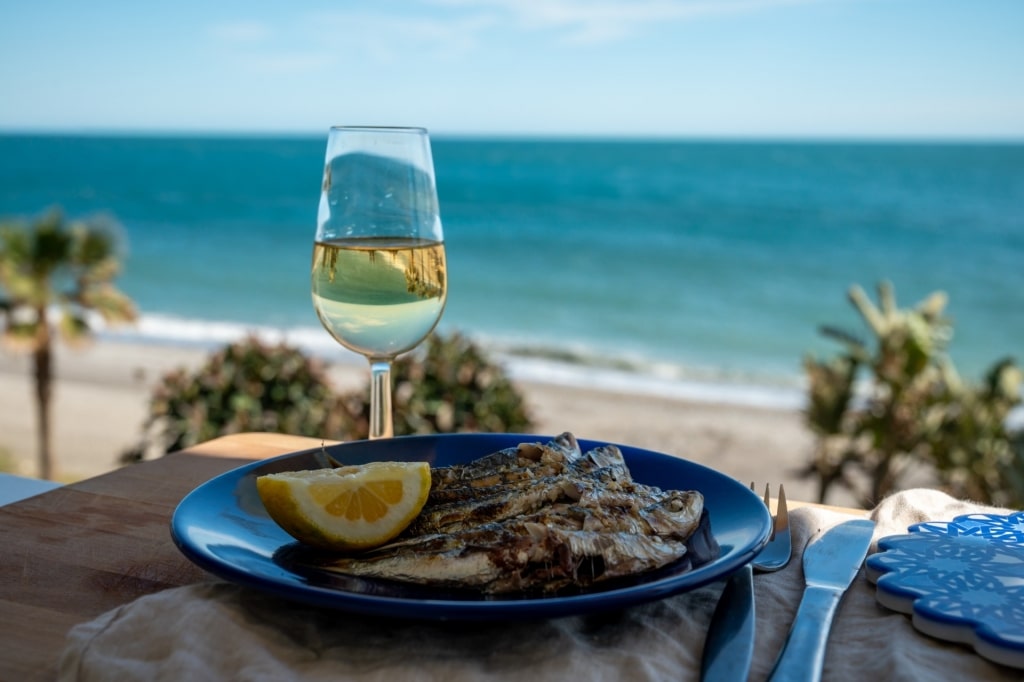
Chiringuito in Marbella
Whichever beach you choose you will never be far from a chiringuito. These seasonal beach bars specialize in good Spanish wines and imaginative tapas.
Admirers of surreal artist Salvador Dalí will want to walk the Avenida del Mar. A collection of sculptures by the Spanish artist line this palm tree-shaded seaside promenade.
Maspalomas, Gran Canaria
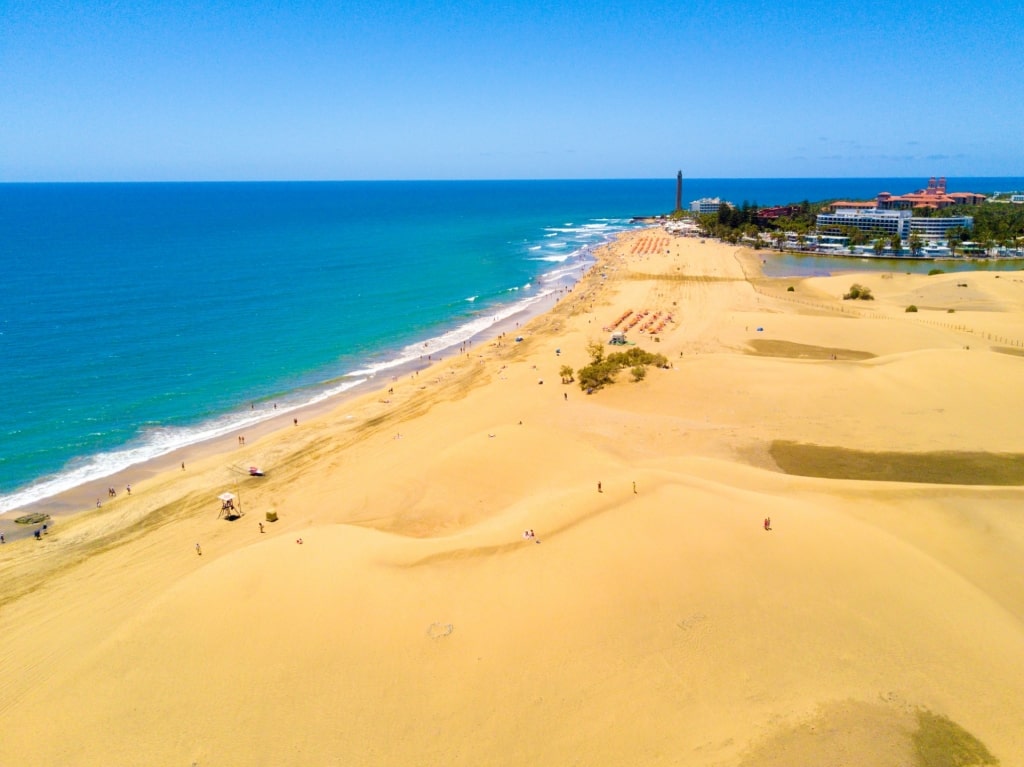
Maspalomas, Gran Canaria
Sitting in the southernmost part of Gran Canaria, the sprawling area of Maspalomas takes in 12 miles of beach front and several towns and villages. Purpose-built for tourism, it has everything from private clinics and foreign language schools to casinos, restaurants, and luxury hotels.
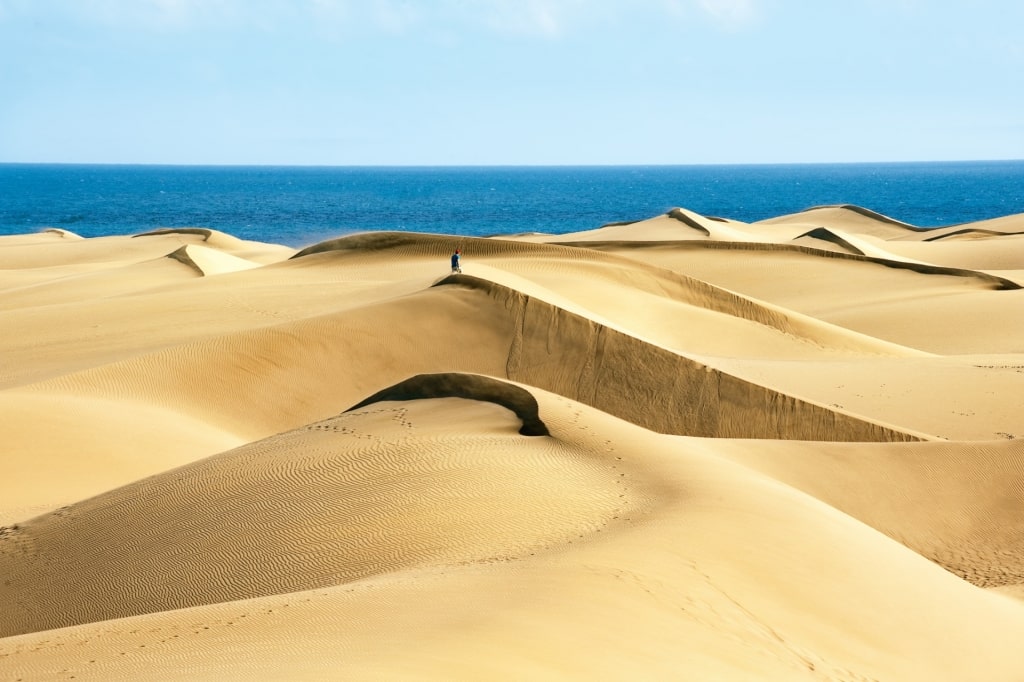
Maspalomas, Gran Canaria
However, the resort’s major attractions remain that long, sandy beach, and the dunes behind it. Part of the dunes are now preserved as a nature reserve, and remind many visitors of the Sahara.
One of the most beautiful places in Spain, the dunes are overlooked by a photogenic lighthouse, which is fronted by a lagoon: La Charca. This is a great place for birdwatchers with an interest in aquatic species such as egrets, spoonbill, or herons. The beach itself also has a school for surfers and kite surfers.

Playa del Inglés in Maspalomas, Gran Canaria
For urban pleasures, the buzzing Playa del Inglés is nearby, while the older San Fernando de Maspalomas is more sedate.
Read: Best Things to Do in Gran Canaria
Nerja
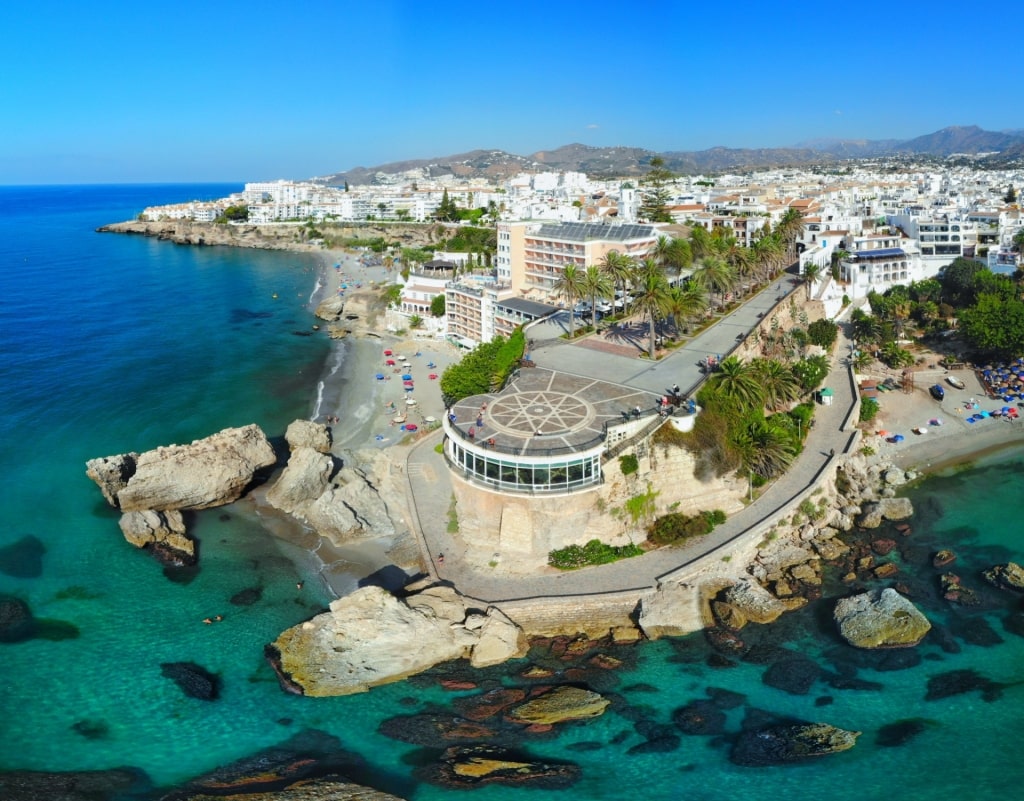
Balcon de Europa, Nerja
The small town of Nerja in Southern Spain, a short drive east of Malaga, is a popular spot for European vacationers. From the Balcon de Europa lookout, you may see snow on the distant peaks of the Sierra Nevada mountain range.
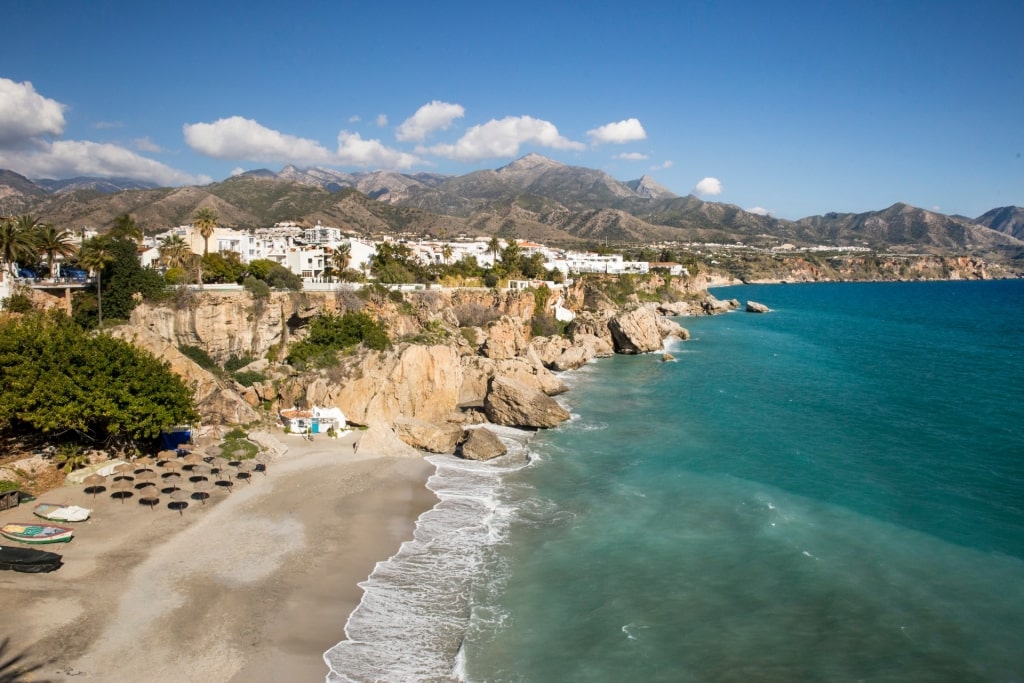
Playa Calahonda, Nerja
The Balcon is a viewing platform that also overlooks Nerja’s beaches and the sparkling Mediterranean Sea. Below is Playa Calahonda, with a small cove separating it from the more popular Burriana beach.
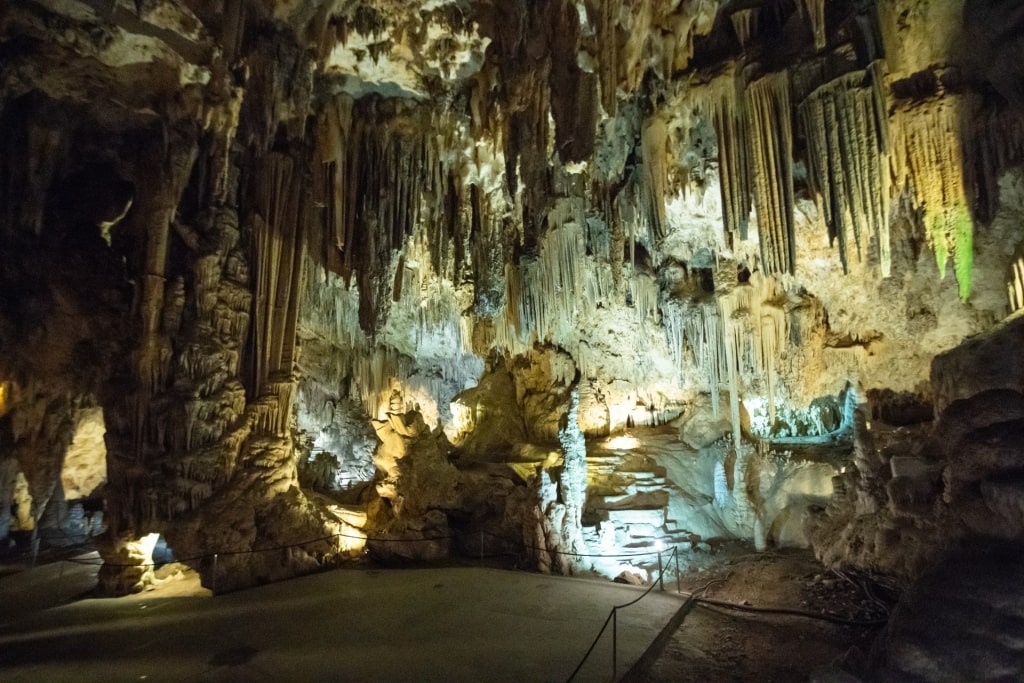
Nerja Caves
Nearby is the pretty village of Maro, where you’ll find the Nerja Caves, one of the best caves in the world. These are a major visitor attraction, with 42,000-year-old cave paintings.
There are numerous hikes around the rugged landscape under which the caves spread for miles. Many are ancient routes once used to bring fish from the coast up to Granada, and fresh produce such as vegetables back down.
Barcelona
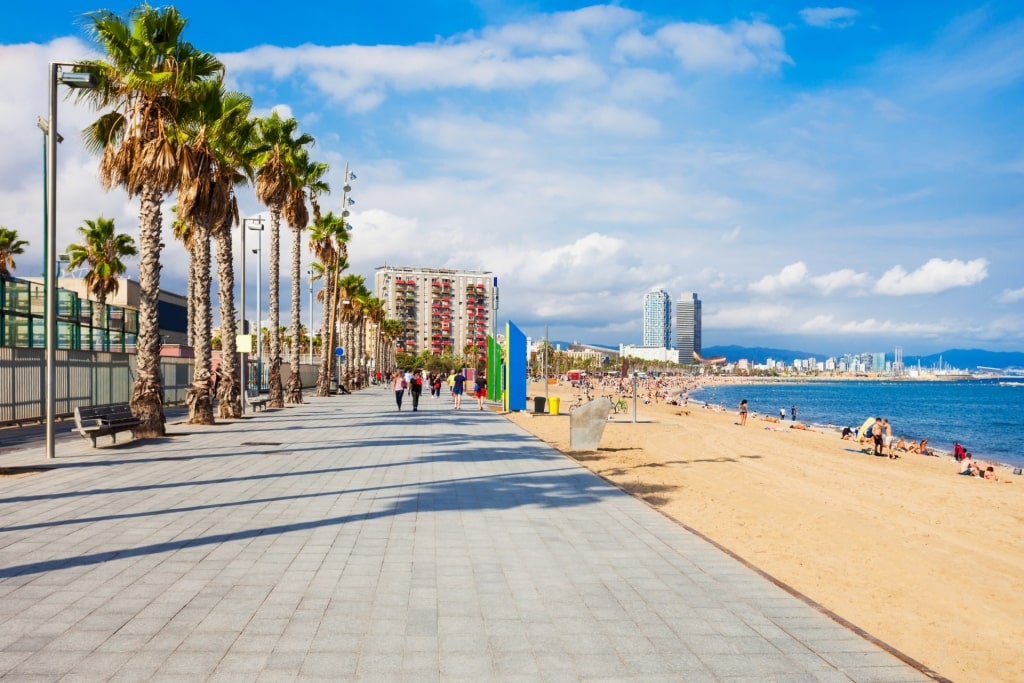
Barceloneta Beach, Barcelona
Gaudí’s audacious Sagrada Familia, the shopping on Las Ramblas, the mountains, and monastery of Montserrat… Barcelona’s major attractions are world famous.
Barcelona’s beaches are perhaps less familiar, as most visitors fill their time with galleries, museums, tapas bars, and shopping. But on a sunny afternoon, you can’t beat lunch on the beach at Barceloneta, a neighborhood that was once the home of fishermen and their families but has now become extremely fashionable.
Although mentioned in Don Quixote, the beach’s present appearance owes a lot to sand shipped in from Egypt. It’s a place to enjoy fresh fish, or just enjoy a cocktail and people-watch.

Playa Sant Sebastià, Barcelona
Even busier, if that’s possible, is Playa Sant Sebastià, where Ricardo Bofill’s W Barcelona hotel is a striking landmark. Playa Somorrostro is slightly quieter, and better adapted to those with limited mobility.

Tapas
Barcelona itself is a food-lover’s dream, from its wonderful tapas restaurants to the fresh produce at Mercat de la Boqueria. Among its dozens of Michelin-starred restaurants are several showcasing Catalan cuisine.
Santa Cruz de Tenerife
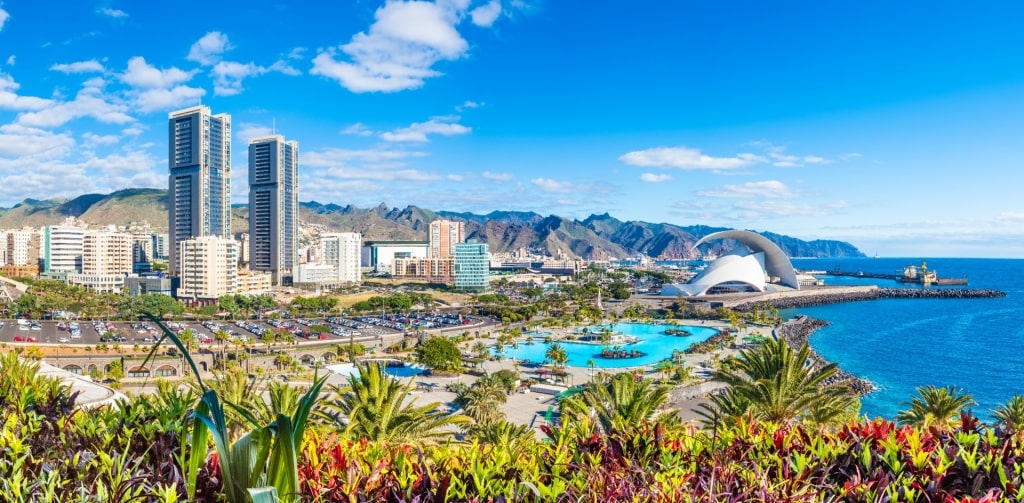
Santa Cruz de Tenerife
The largest of the seven Canary Islands, Tenerife is very popular with European travelers for its year-round sunshine.
Playa de Las Teresitas, just outside Santa Cruz, the island capital, is a delight, with its white sand and palm trees.
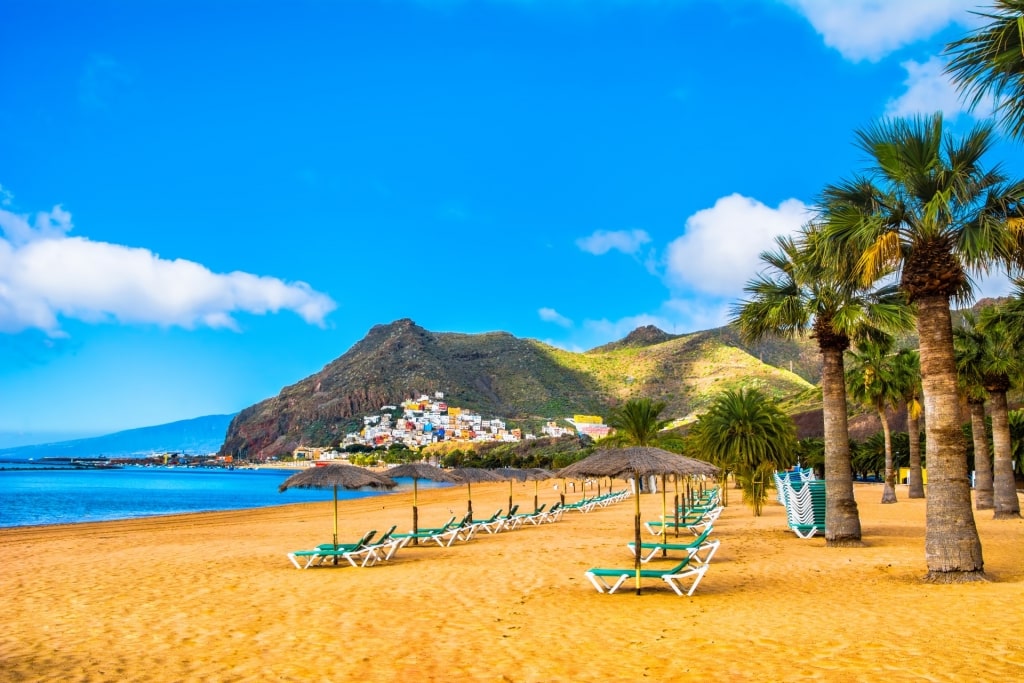
Playa de Las Teresitas, Santa Cruz de Tenerife
This beach has a secret though: its sand was first imported from nearby Africa in the 1970s. Most of the other beaches on this volcanic island are of black sand.
When you’ve enjoyed some time on Tenerife’s beaches, explore the city, which has plenty of authentic bars, good restaurants, and shopping. Stroll the pedestrianized Calle del Castillo, or visit the beautiful Botanical Garden.
Benidorm
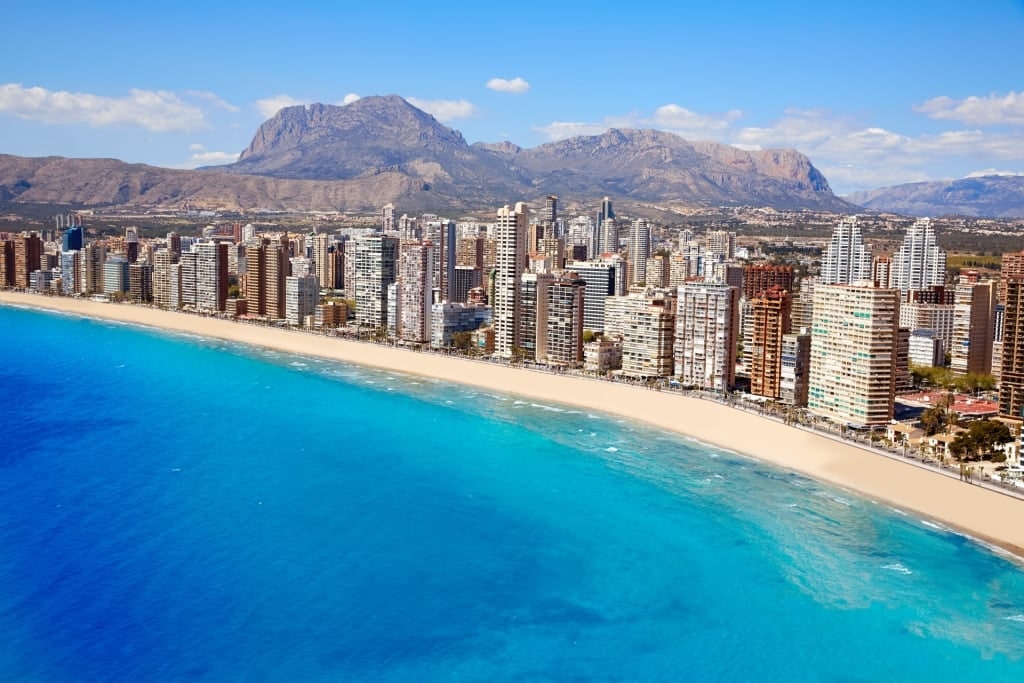
Playa Levante, Benidorm
It’s hard to recognize that Benidorm was a tuna fishing village just over 50 years ago. Now one of Spain’s most popular holiday spots, it’s at the heart of the Costa Blanca. Getting here is an easy drive from Alicante.
El Castell, the oldest part of Benidorm, stands on a headland that splits its coastline into two magnificent beaches. To the east is Playa Levante (“Sunrise”), with Playa Poniente (“Sunset”) to the west.
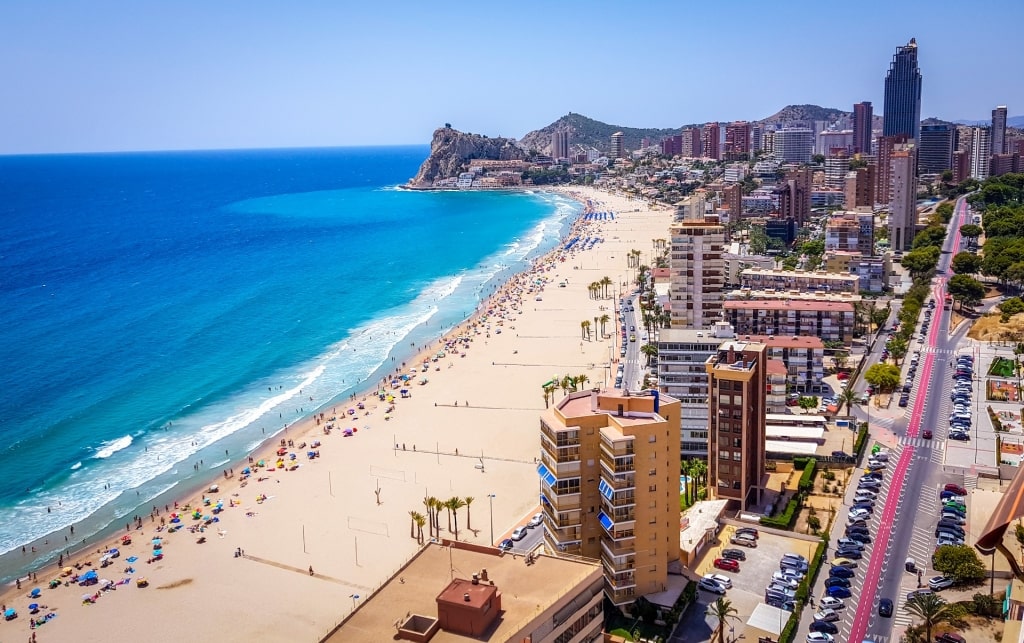
Playa Poniente, Benidorm
Both have lovely, fine sand, Blue Flag certification, and all the facilities you can imagine. Levante is busier, while the longer Poniente is a quieter place to stroll or take the family.
With its cosmopolitan range of visitors, Benidorm has every possible style of food, from British to exquisite sushi. Its Spanish cuisine remains a delight, however, and a tapas tour is a must-do.
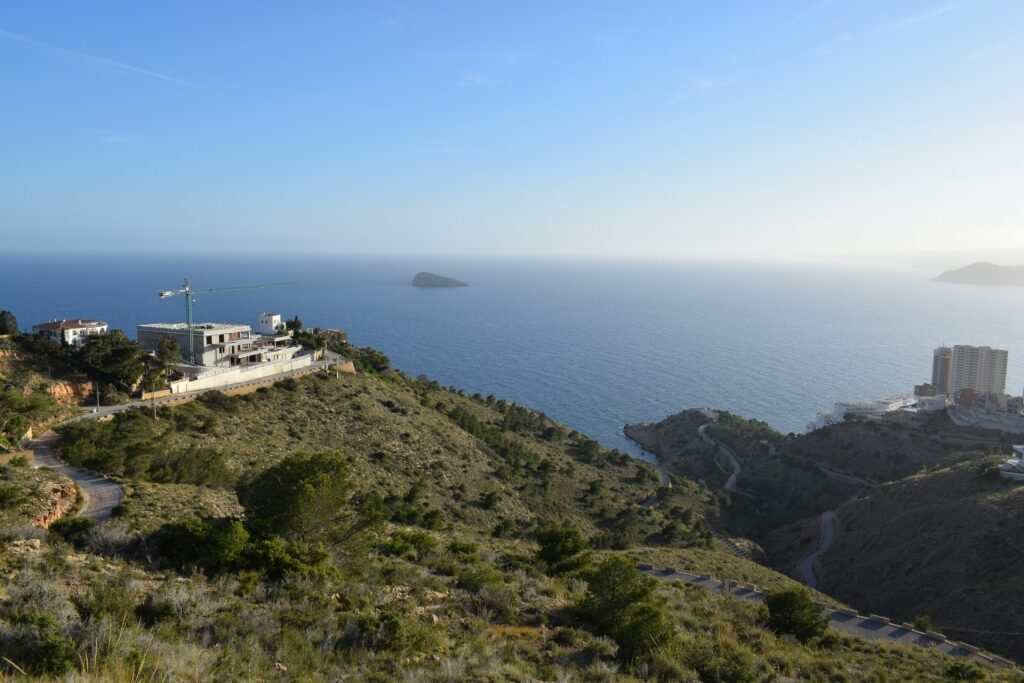
Mirador de la Cruz, Benidorm
A visit to the Mirador de la Cruz, overlooking the city, is another essential. It’s in the hiker-friendly Sierra Gelada Natural Park, which protects both land and sea.
Ibiza Town
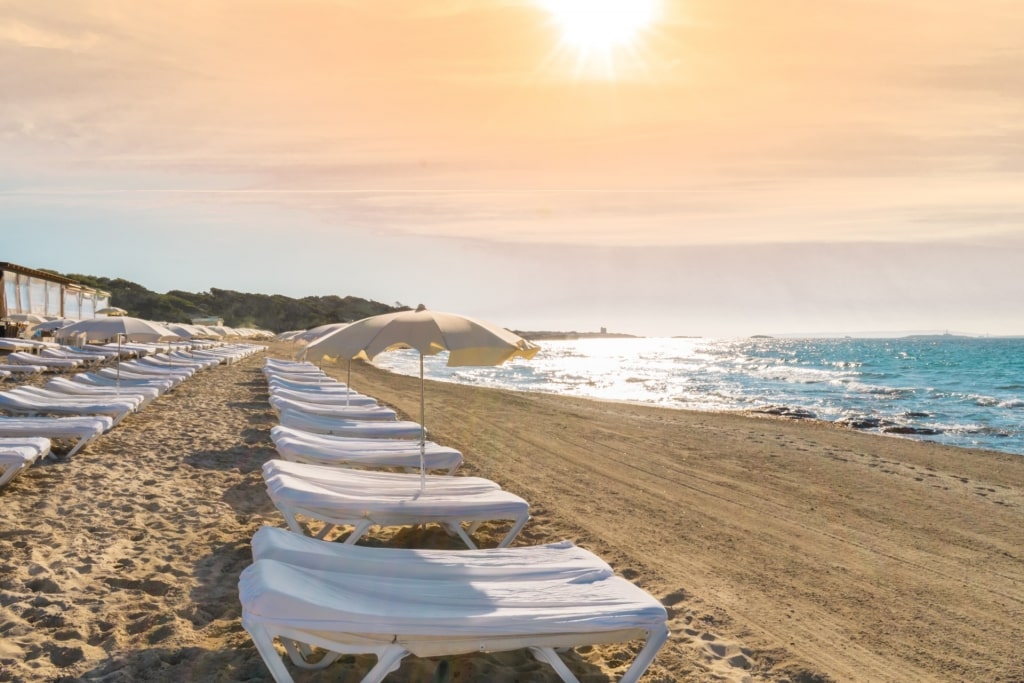
Platja Ses Salines, Ibiza
The Spanish island of Ibiza is well known as a party destination, with plenty of lovely beaches to sleep off late nights. You don’t have to head far from hilly, historic Ibiza Town, however, to enjoy some of those beaches.
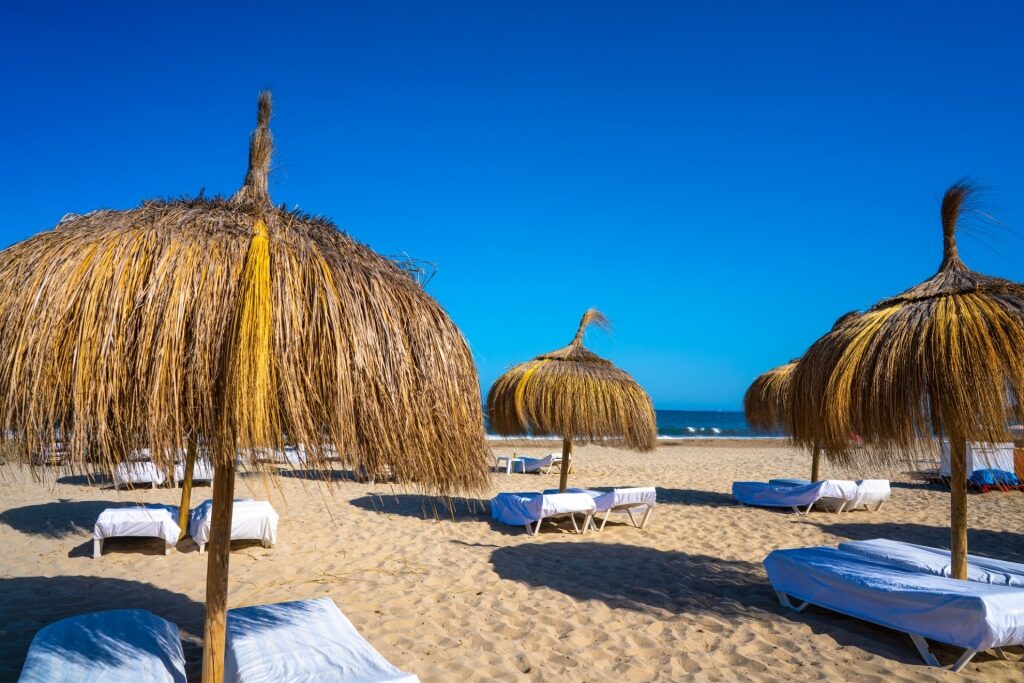
Platja d’en Bossa, Ibiza
One of the best beaches in Ibiza, Platja d’en Bossa is right in the center of town and is a place where you can take in the lovely white sand and warm blue water.
A short drive southwest of Ibiza, Platja Ses Salines is a protected area of colorful salt beds, and wetlands—as well as a lovely beach with some extremely fashionable bars and restaurants. This is a great environment for birds, and birdwatchers, with flamingos being regular visitors.
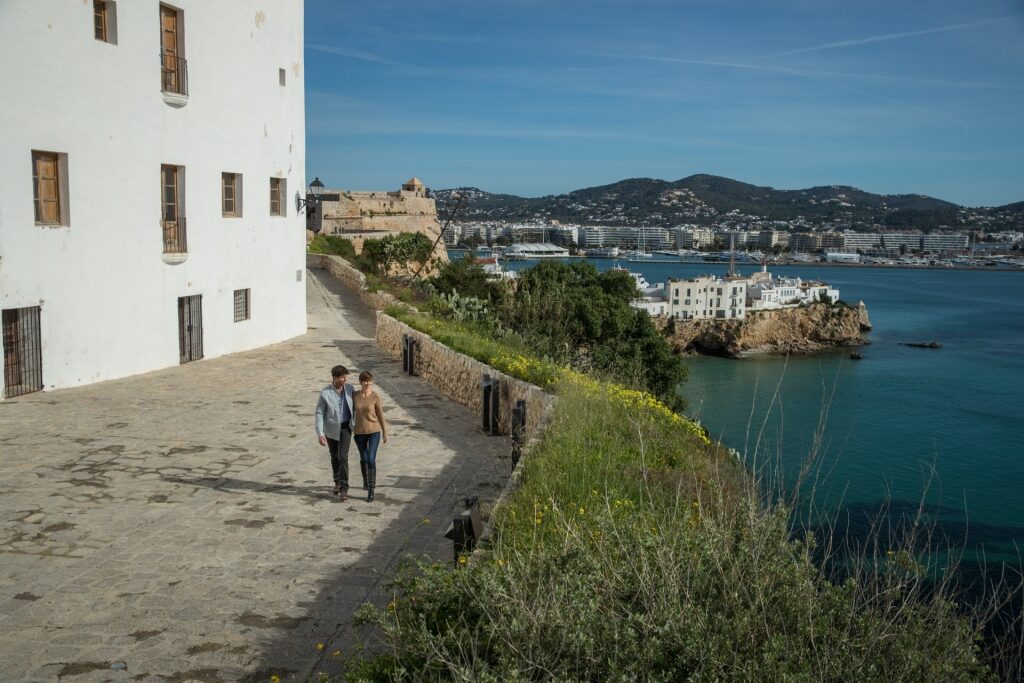
Dalt Villa, Ibiza
Take time to explore the UNESCO-protected old town of Dalt Villa. Fortified, and standing on a cliff with great views, it is also full of great little restaurants.
You can stroll cobbled streets to the top of the hill for views across the sparkling sea to Formentera island, and browse the shops for floaty, hippie-chic Ibiza fashions and other Spanish souvenirs.
Read: Best Places to Visit in Spain for First-Timers
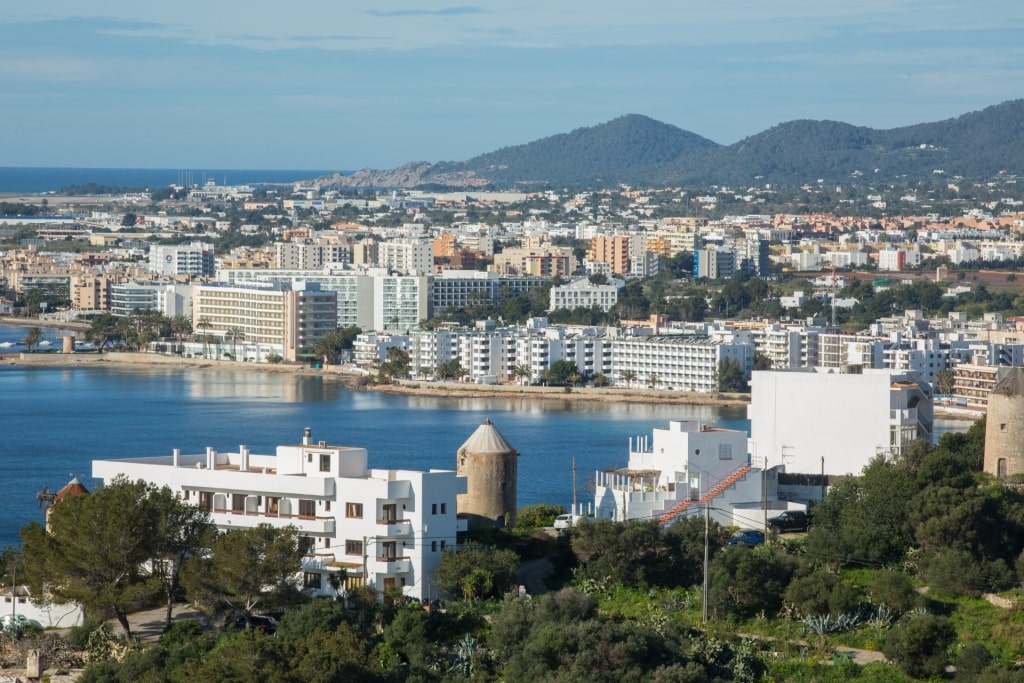
Ibiza
Inspired to visit some, or all, of these lovely Spanish coastal cities? Then browse Celebrity’s Spain cruises to find the perfect cruise for you.
